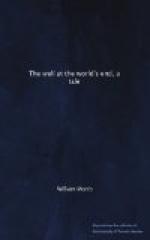Waned the day and I hied me
afield, and thereafter
I sat with the mighty when
daylight was done,
But with great men beside
me, midst high-hearted laughter,
I deemed me of all men the
gainfullest one.
To wisdom I hearkened; for
there the wise father
Cast the seed of his learning
abroad o’er the hall,
Till men’s faces darkened,
but mine gladdened rather
With the thought of the knowledge
I knew over all.
Sang minstrels the story,
and with the song’s welling
Men looked on each other and
glad were they grown,
But mine was the glory of
the tale and its telling
How the loved and the lover
were naught but mine own.
When he was done all kept silence till they should know whether the lord should praise the song or blame; and he said naught for a good while, but sat as if pondering: but at last he spake: “Thou art young, and would that we were young also! Thy song is sweet, and it pleaseth me, who am a man of war, and have seen enough and to spare of rough work, and would any day rather see a fair woman than a band of spears. But it shall please my lady wife less: for of love, and fair women, and their lovers she hath seen enough; but of war nothing save its shows and pomps; wherefore she desireth to hear thereof. Now sing of battle!”
Ralph thought awhile and began to smite the harp while he conned over a song which he had learned one yule-tide from a chieftain who had come to Upmeads from the far-away Northland, and had abided there till spring was waning into summer, and meanwhile he taught Ralph this song and many things else, and his name was Sir Karr Wood-neb. This song now Ralph sang loud and sweet, though he were now a thrall in an alien land:
Leave we the cup!
For the moon is up,
And bright is the gleam
Of the rippling stream,
That runneth his road
To the old abode,
Where the walls are white
In the moon and the night;
The house of the neighbour
that drave us away
When strife ended labour amidst
of the hay,
And no road for our riding
was left us but one
Where the hill’s brow
is hiding that earth’s ways are done,
And the sound of the billows
comes up at the last
Like the wind in the willows
ere autumn is past.
But oft and again
Comes the ship from the main,
And we came once more
And no lading we bore
But the point and the edge,
And the ironed ledge,
And the bolt and the bow,
And the bane of the foe.
To the House ’neath
the mountain we came in the morn,
Where welleth the fountain
up over the corn,
And the stream is a-running
fast on to the House
Of the neighbours uncunning
who quake at the mouse,
As their slumber is broken;
they know not for why;
Since yestreen was not token
on earth or in sky.




